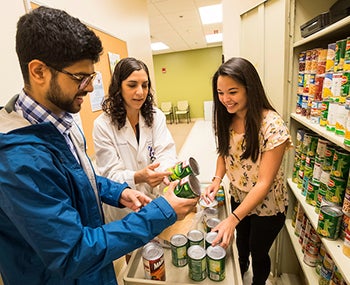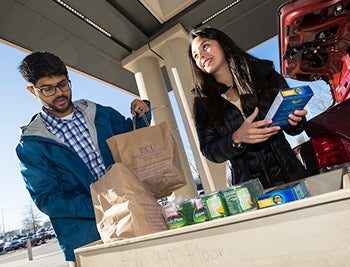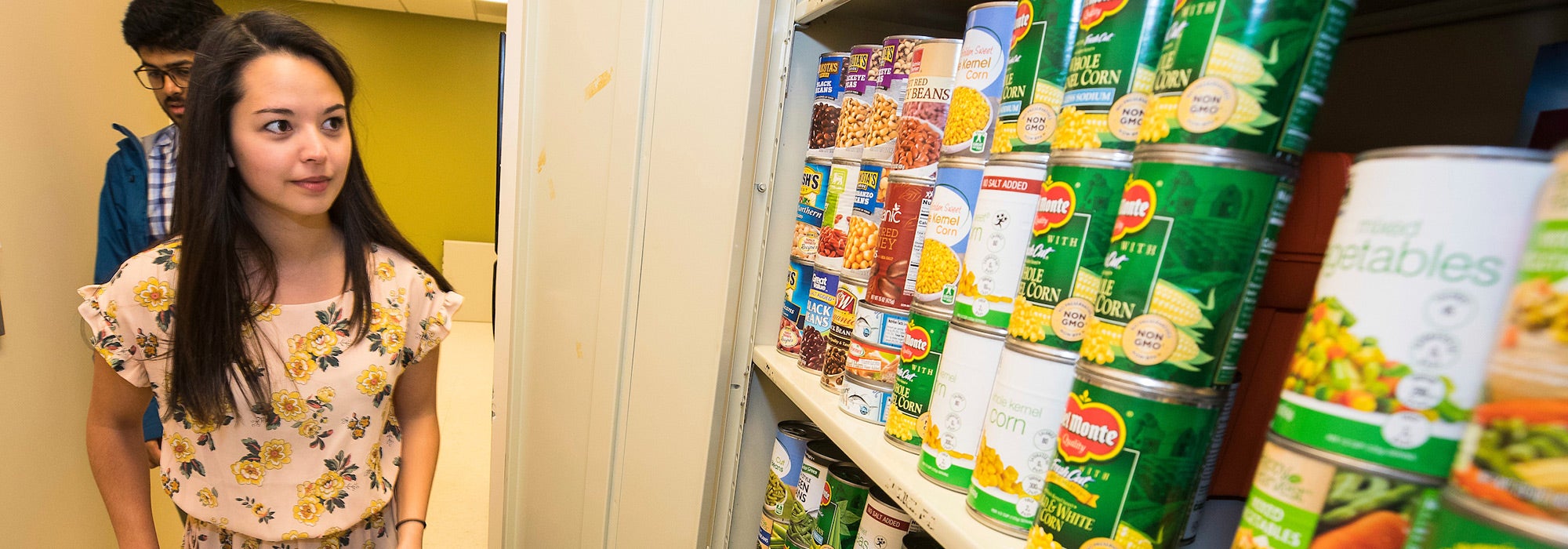FOOD PANTRY AT BRODY
New food pantry opens at ECU’s Brody School of Medicine
A new medical food pantry at ECU’s Brody School of Medicine aims to improve the health of patients in the region who lack access to adequate amounts of healthy food.
The pantry – a collaboration between Brody faculty and students, Vidant Medical Center and the Food Bank of Central and Eastern North Carolina – will provide emergency food boxes to patients who have been identified as having food insecurity. Organizers hope to help these patients with their recovery by providing nutritious food recommended by their health care teams based on their medical conditions.
The pantry will initially provide food to patients being discharged from the hospital, but the program is expected to expand to include patients visiting ECU Physicians.

Dr. Susan Keen collects and weighs food for the food pantry at ECU’s Brody School of Medicine with M3 students Shazeb Khan and Shannon Osborne.
“I was seeing that our patients with dietary restrictions due to diabetes or hypertension were struggling to make healthful food choices because they lacked access to adequate amounts of healthy food, and that was leading to less than desirable outcomes,” said Kay Craven, director of nutrition services at ECU Physicians and one of the project’s organizers.
When Craven partnered with professor emeritus Dr. Kathryn Kolasa to educate resident physicians about the importance of nutrition in patient care, it didn’t take long for them to realize that referring patients to local food pantries wasn’t enough.
“A typical food pantry is going to have a lot of food that is less healthy and less healing than what we’re going to do,” said Kolasa. “If you go into the food bank that’s downtown you’re going to get whatever people or companies wanted to donate. They could have stacks of candy bars or potato chips. They don’t think about the fact that some of these people are sick and have different needs.”
Organizers say one of the most important aspects of the new food pantry is its location off Moye Boulevard, between the Leo Jenkins Cancer Center and Vidant Medical Center.

Third-year medical students Shazeb Khan and Shannon Osborne collect items for a new food pantry at ECU’s Brody School of Medicine.
“One of the main things we talked about at the beginning of this project, in terms of the patients, is that many of them are on Medicaid,” said third-year medical student Shannon Osborn. “Medicaid will pay for transportation to medical appointments, but it’s not going to pay for transportation to a grocery store or food pantry. So if we can put a food pantry in an area where there’s a high volume of people who are food insecure with the provided transportation to their medical needs, there’s a higher chance for success.”
The U.S. Department of Agriculture reports that one in eight Americans are food insecure.
Throughout the month of March, in celebration of National Nutrition Month, medical students enrolled in Brody’s Service Learning Distinction Track are holding a food drive to benefit the new pantry. Organizers are requesting that donors be mindful of the dietary restrictions patients may be facing and contribute nonperishable and canned foods low in sodium and sugar.
“We were so grateful for the 884 pounds of food donated during our November food drive,” said Dr. Susan Keen, co-director of the service-learning track. “Our goal for March is even bigger!”
Dr. Kori Brewer, associate professor in the Department of Emergency Medicine, will be running in the Boston Marathon, which has declared this to be a “Year of Service” to honor those who lost their lives five years ago in the bombing.
“We are excited to support Dr. Brewer’s efforts by collecting 100 pounds of food for every mile she runs,” Keen said. “That means our goal is 2,620 pounds of food by March 31.”
Items most helpful to our patients are:
- Fruits (no sugar added): applesauce, mandarin oranges, peaches, pears, pineapple, tropical fruit, dried fruit
- Vegetables (no salt): asparagus, artichokes, green beans, collard greens, carrots, mixed vegetables, mushrooms, okra, spinach, tomatoes, corn, lima beans, pumpkin
- Grains: Brown rice, whole wheat pasta, grits, wheat tortillas, quinoa, plain oatmeal, corn bread mix, cereals with less than 10g of sugar per serving
- Beans (dried or canned): pinto, navy, black, kidney, white, chickpeas, black-eyed peas, lima, lentils, baked beans
- Meat/protein: canned chicken breast, salmon, tuna, and no-sugar-added peanut butter
- Dairy: dried, powered or evaporated milk in boxes, pouches or cans
